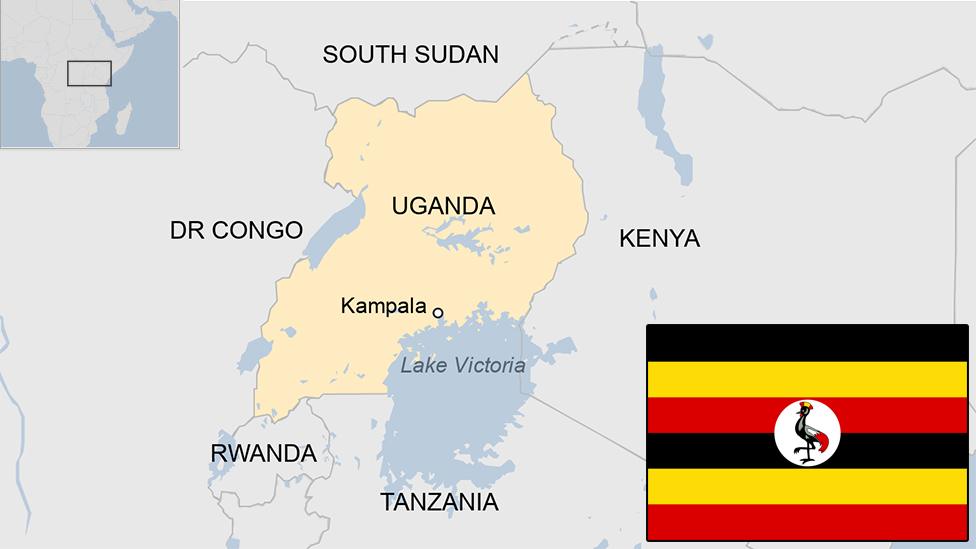Uganda's missing: Hundreds of families fear for those taken away
- Published
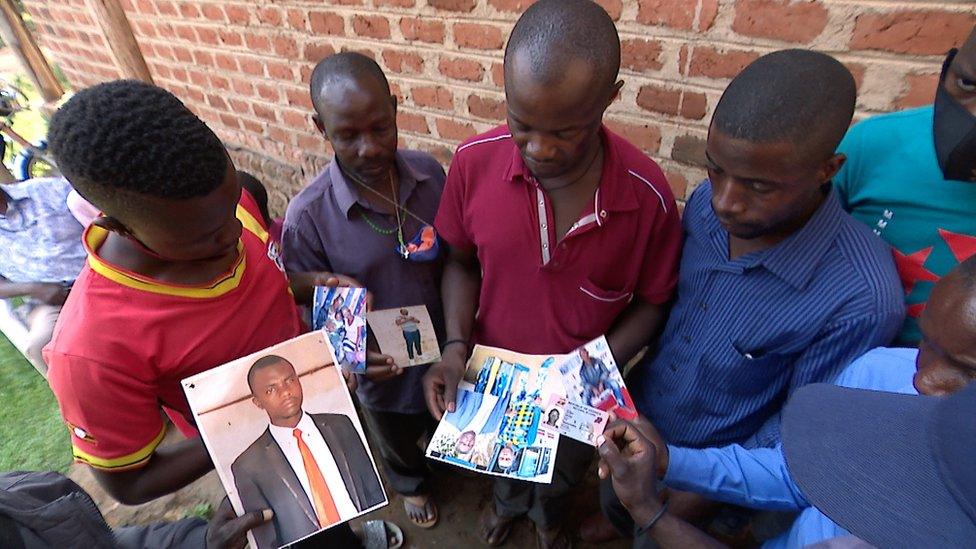
Villagers from Kisamula want to know where their relatives are
Hundreds of people in Uganda are still missing after being detained following raids on their homes or in the aftermath of election campaign rallies. The BBC's Patience Atuhaire has been talking to some of those affected.
It was in the early hours of the morning when more than a dozen people - armed, uniformed and masked - descended on the village of Kisamula, 150km (95 miles) south-west of the capital, Kampala. After driving house to house, they made off with 18 young men, said to mostly be opposition supporters.
Two months after the raid, which happened in the run-up to January's bitterly contested general election, not one of those taken has returned.
Warning: This story contains graphic testimony which may be upsetting
Ronald Muwonge is among the missing.
I cried to them again and again: 'Can you at least tell me where you're taking my husband?'"

He was at home with his wife, Teddy Naluswata, when someone started banging on their door at 03:00.
"They called Muwonge to either open up or they would break it down," Ms Naluswata recalls.
"They said they were police. I rushed to the door, told him to get dressed. The door flung open, and one of the men pushed a gun in my ribs and told me to get out of the way.
"They dragged Muwonge out, and threw him down in the grass, beating him."
The men then searched the house, methodically.
"There were maybe about 15 of them, dressed in black police uniform, with masks and berets.
"One found my husband's wallet. There was about 70,000 shillings ($20; £14) in there. I begged him: 'Please, you've taken my husband, leave the money for me and my children,'" says the mother who is expecting her third child.
"He emptied the wallet. I cried to them again and again: 'Can you at least tell me where you're taking him?'"
They did not reply.
'Echoes of Idi Amin'
It was only after sunrise that Ms Naluswata learnt the full scale of what had befallen the village - when she met her neighbours with similar stories at the police station.
For some this has echoes of Idi Amin's rule in the 1970s, when thousands of people were killed or disappeared, some dragged away in broad daylight, never to be heard from again.
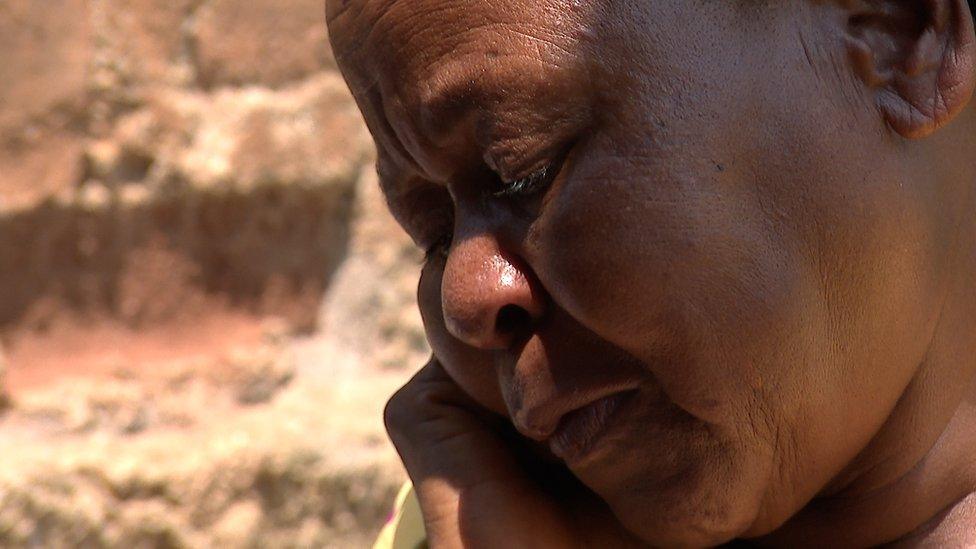
Margaret Nalinnya is worried that her nephew was killed in the raid
John Kiwanuka, the nephew of 65-year-old Margaret Nalinnya, was also taken in the raid on Kisamula.
The house was a mess when she went to see what had happened.
"When I saw the pool of blood on his bedroom floor, there was one thought in my mind: 'My child is dead.' I sat on the veranda, unable to move," Ms Nalinnya says, overcome by violent sobs, her body shaking.
Villagers told the BBC that Mr Kiwanuka was shot in both legs before he was bundled into a van.
Two months on, his home still lies desolate.
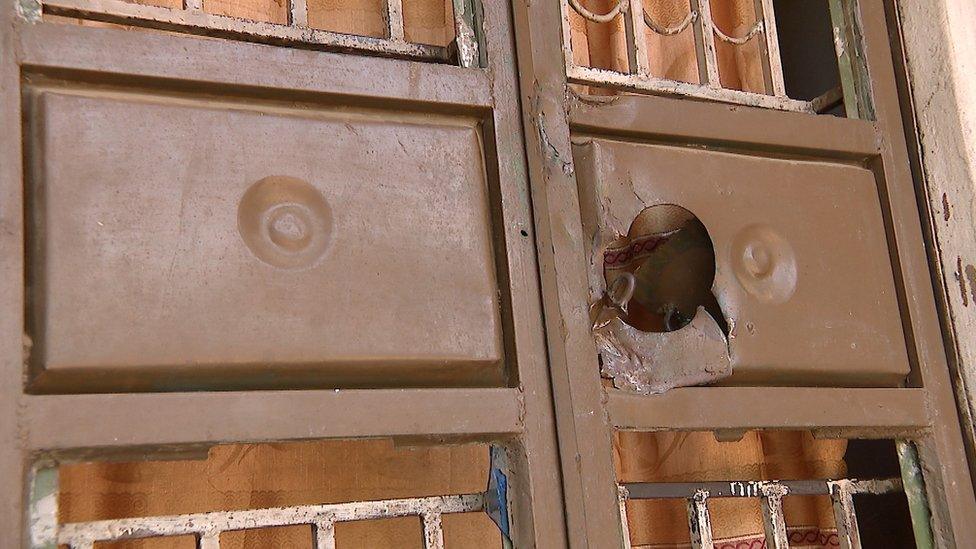
Part of the door into John Kiwanuka's house was smashed in
The broken metal front door, which is missing its glass panels, and a gaping hole in the ceiling show the level of force used.
Mr Kiwanuka paid for his aunt's food and provided money for her hypertension medication. Ms Nalinnya's health has deteriorated since he was taken away.
An official complaint filed by lawyers to Masaka regional police on behalf of Mr Kiwanuka's mother says that the 18 who were taken were shoved into two mini-buses.
Taken by 'drones'
It is believed that across the country, hundreds of opposition activists and campaigners were picked up in similar fashion.
Many reports have emerged about a certain type of mini-bus, with tinted windows and untraceable licence plates, preferred by the armed personnel who carry out these arrests, that the vehicle has come to be known locally as a "drone".
I was on the floor of the drone, one arm handcuffed to a seat, blood flowing into my eyes. Whenever I tried to raise my head, someone stamped it down"

In November, two months before the Kisamula raid, as the election campaign was heating up, Julius Kiberu had just hopped off a commuter taxi in Kisowera east of Kampala, when he heard gunshots ring out.
People scattered in every direction. He ducked and ran, hoping to hide behind the shops.
Two armed men in plainclothes jumped out of a "drone" and grabbed him by the waist of his trousers.
"One of them knocked me on the head with a baton. I blacked out.
"When I came to, I was on the floor of the 'drone', one arm handcuffed to a seat, blood flowing into my eyes. Whenever I tried to raise my head, someone stamped it down," the 35-year-old electrician says, instinctively touching the scar.
Hours later, Mr Kiberu says that he, and the others who had been picked up in the same way, arrived at a compound.
Hoods were thrown over their heads before they were dragged into a pitch-black room, he adds.
The monotonous routine of being questioned would be broken up with beatings.
"They asked me again and again: 'Where is the gun? Are you rebels? Did you tear down the president's campaign posters?'
"I think sometimes I was beaten with a stick, other times with an electric wire. Sometimes, they would make us lie down in a line, and walk on our backs with heavy boots. I prayed to God."
Left in a forest
Mr Kiberu says the beatings and being held in one position for hours have left his left leg numb and he now walks with a limp.
He still has no idea who was holding him or in which part of the country he was detained.
In February, after more than 11 weeks of detention and having been transferred to three different locations, he was dumped in the middle of the night in a eucalyptus forest over 100km from his home.
"I was pushed from the van, my head still covered, my hands tied. The soldier told me to lie face down, and not move. He took off the hood and just left."
After managing to wriggle his hands free, he found a police post along a dirt road, and asked for help.
His eyes are now bloodshot and his sight still poor after spending weeks in darkness.
"Every time I close my eyes to sleep, it all comes back," Mr Kiberu says, looking around nervously as if expecting someone, or something, to suddenly appear.

More on Uganda's election:

The election saw singer-turned-politician Bobi Wine mount a strong challenge to President Yoweri Museveni, who eventually won a sixth term.
Throughout the campaign, security forces carried out mass arrests as they broke up opposition rallies while enforcing coronavirus pandemic restrictions on the gathering of crowds.
The NGO Legal Aid Service Providers Network documented 511 cases of "arbitrary arrests and unlawful detention" across the country between October 2020 and January this year.
"Sixty-five (13%) were released from police cells without being charged as some had been arbitrarily arrested and detained for more than 48 hours," its report reads in part. According to Ugandan law, suspects must be produced in court within 48 hours of their arrest.
On 31 December, in the Lake Victoria Island district of Kalangala, 126 people were arrested at a Bobi Wine campaign rally.
They were later granted bail by a magistrate's court, only for 49 of them to be re-arrested and charged with possession of four rounds of ammunition before the military court.
Despite their plight, their friends and family are comforted by the fact that they are in a designated prison.
The whereabouts of hundreds others arrested under similar circumstances remain unknown.
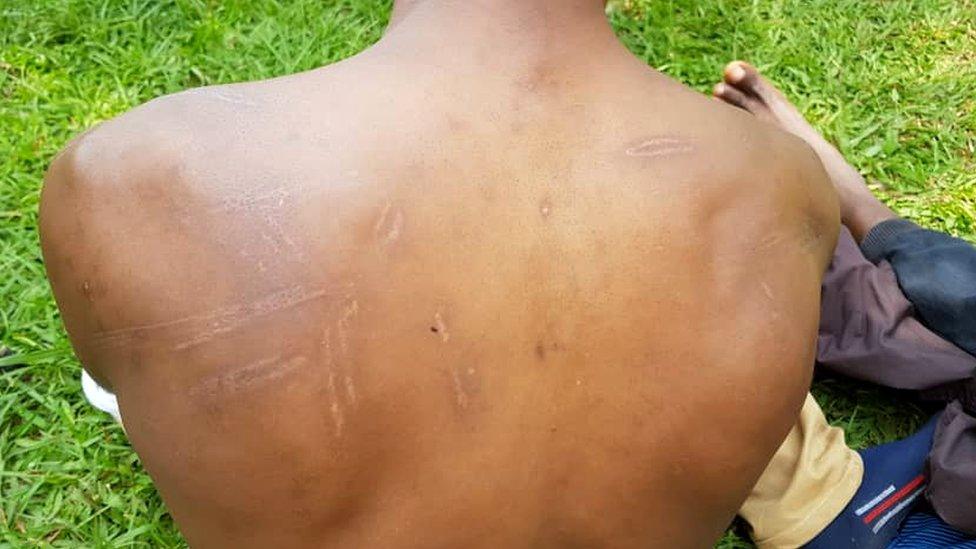
The BBC spoke to a number of people who had marks on their backs which they said were a result of torture
Bobi Wine's party, the National Unity Platform, has published a list of 423 of its supporters who it says are missing - largely from the Central Region, which includes the village of Kisamula, and where the party won several parliamentary seats.
A number of them, the party says, were polling agents in possession of evidence of vote-rigging.
When questions were asked, security officials at different levels initially avoided answering or appeared to deny that there was an issue.
But on 4 February Internal Affairs Minister Gen Jeje Odongo admitted to parliament that there had been an "overzealousness on the part of the soldiers".
President Museveni later ordered the security agencies to produce a list of those in detention, while also dismissing claims that Ugandans were being arbitrarily abducted, saying that those who had been arrested were criminals and terrorists.
Last week Gen Odongo finally presented a list of 176 names, with details of when and where they were arrested, the charges against them and where they were being held.
Some had been held for allegedly participating in protests, others for possession of military material and others for holding meetings to plan post-election violence.
Some of the missing return
The largest number, the list shows, are under military detention and the minister said investigations were continuing to find if there are any others.
Over recent weeks, a few detainees have resurfaced, some dumped in bushes near their villages, barely hanging on to life. Some are in intensive care in hospitals, while others are nursing gruesome injuries.
One former detainee told the BBC that his testicles were tightly tied with ropes for hours, and at other times held against flames.
Local media have published a series of testimonies, in which former detainees say they were electrocuted or forced to eat rotten food.
But none of the 18 missing from Kisamula have reappeared.
If the government doesn't want democratic politics, why don't they just abolish it"

The two sons of Francis Luganzi, a 45-year-old carpenter, were also among the 18.
He has given up hope of ever seeing them alive again.
"I doubt that they survived those beatings," he says, holding his head in his hands.
"I have cried all day and all night for weeks. If our children are dead, the government should just give us the bodies and we bury them.
"If the government doesn't want democratic politics, why don't they just abolish it?
"Every Ugandan has a right to support whoever they want. It is not a crime."
Related topics
- Published10 November 2020
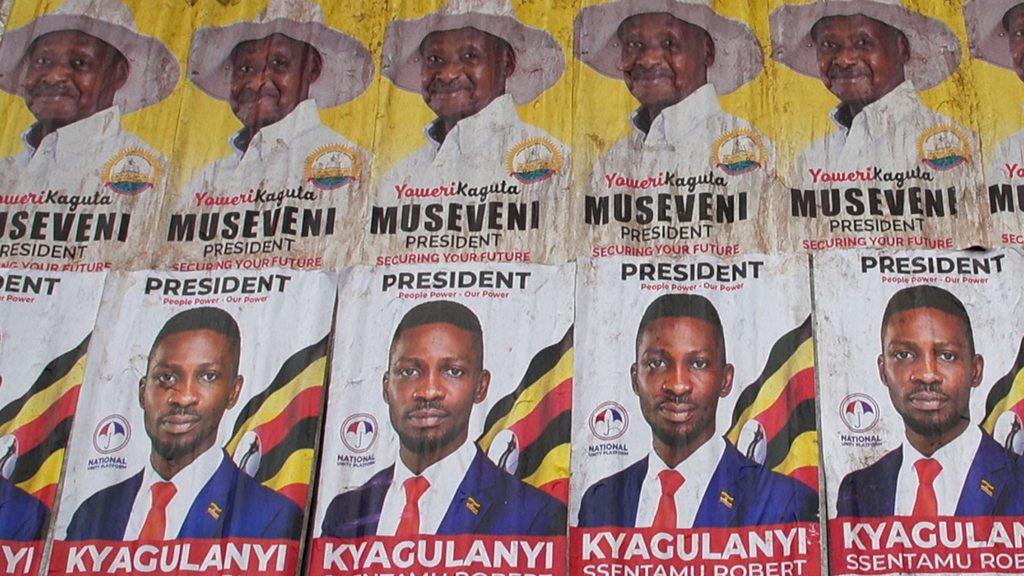
- Published26 April 2023
